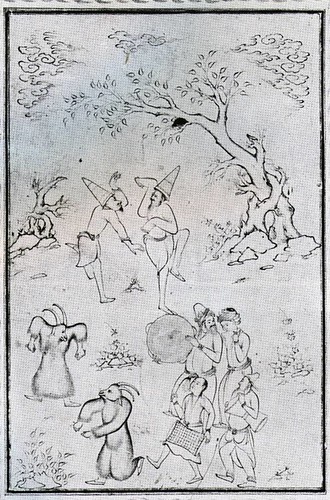a love-sick roué
All day, Saghi, I was drunk on you.
God knows, all day I waited for you.
Give me the wine, let the world keep its traps.
I stalked you all day, tonight I will too.
#1251: From Rumi's Kolliyaat-e Shams-e Tabrizi
Search word: drunk
I spent time yesterday in the company of a friend and, without drinking a drop of wine, I was happy, excited, agitated, intoxicated. I thought I would explore further this theme of drunkenness which is referred to ad nauseam by Persian poets. In an earlier entry, a simple wine, I first encountered this cupbearer, saqi or here Saghi, a young man who serves the wine at all-male drinking parties. Despite all the assurances that Rumi meant his wine to refer to spiritual things only, I find it more plausible to believe that homosexual practices were a common and regular feature of these parties. The following photo, taken by segovius on his travels, shows a sketch of such spiritually drunken males. The artist has expressed the latent eroticism most blatantly in the formation of tree trunks in the upper right hand corner.

Dancing Dervishes @ Anulios Flickr Gallery
As with any spiritual or archetypal symbol, homosexual love must have been lived out very commonly long before the penny dropped as to its more subtle spiritual meaning. Islamic historians writing about Rumi are very careful how they describe his relationship with Shams and later male friends. His repeated expressions of desire for the saqi are treated strictly as metaphor. It's hard to believe that earthy reality was not mixed in with spiritual allegory.
One of the loveable characteristics of Rumi is the ease and comfort with which he can identify with human traits that are normally seen as negative. Here he portrays himself as a love-sick roué, driven to stalking his prey, the young man - any young man - who serves up the wine (and is probably also required to be available for homosexual favours). This earthy image of unadulterated lust projects such a solid, substantial sense of the devotee's love for the beloved. Why should the love between our human and our divine natures be portrayed only in divine terms? No, that is silly. This love between (wo)man and God(dess) is as lusty as it is light. It is empty if it is not lived out in some way. (OK, and shallow if lived out without insight.)
Again, in this short verse, Rumi overlays opposite tendencies so that the erotic union occurs within and between the very lines of verse. In the third line he affirms the other-worldliness of the wine, he turns his back on the traps of literal interpretation (living out without insight). And yet the whole tone of the verse is so earthy and even banal, pulling us downward into everyday life. Just as his act of stalking continues on from day into night, so too is there a mutual penetration between lover and beloved, both male, both female, both neither, both both.



0 Comments:
Post a Comment
<< Home